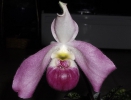|
|
|
|
|
| |
Established Seedlings of
Paphiopedilum vietnamense 'Twin NyNa' × self |
|
| |
|
|
| |
| Number: |
TN8096 |
| Name: |
Paphiopedilum vietnamense 'Twin NyNa' × self
|
| Type: |
self (What's that?) |
|
Seed Donor: |
Mr. Thuan Viet Nguyen
|
|
No Photos Available
Click to Enlarge
![Thumbnail]()
Pod Parent |
Click to Enlarge
![Thumbnail]()
Pod Parent |
Click to Enlarge
![Thumbnail]()
Pod Parent |
Click to Enlarge

Pod Parent Flower |
|
|
|
| |
For additional origin/habitat information supplied courtesy of
Charles and Margaret Baker, see further below, near the bottom of this page.
|
Temperatures we attempt to use in the lab & greenhouse:
| For Species: |
|
Spring, Summer, Autumn: days average 84°F, nights 71°F; best fit is Warm-Intermediate 87-64°F
(Source:
Baker's Web OSC) |
| For Species: |
|
Winter: days average 62°F, nights 49°F; best fit is Cool-Cold 64-44°F
(Source:
Baker's Web OSC) |
|
About the name...
| Etymology of |
Paphiopedilum |
|
From Greek "Paphia" the name of Aphrodite of Cypress; "pedilon", sandal.
(Source:
Pridgeon 1992) |
| Pronunciation of |
Paphiopedilum |
|
paf-ee-oh-PED-i-lum
(Source:
Pridgeon 1992) |
|
If you would like to direct someone to this web page, please copy and paste this URL into your email:
http://troymeyers.com/d?128096
|
ESTABLISHED SEEDLINGS
of these are not currently available, but we have some maturing in the greenhouse and expect to offer them in the future.
There are 6 items with
1 plant per
item that will be considered for sale later.
Click here to see if we have flasks available.
|
|
|
| |
The origin/habitat information below is supplied courtesy of Charles and Margaret Baker
The following information is based on the name of the plant provided by the donor, and assumes that the name is correct. If the plant has been misidentified, then the following information may not be correct.
This text is copyrighted by the Bakers and may not be reproduced without permission.
ORIGIN/HABITAT: Northern Vietnam near the Chinese border in the provinces
of Cao Bang, Ha Giang, or Tuyen Quang. Plants reportedly grow
lithophytically on mossy, weathered limestone, and collections have been
reported at 2300-3950 ft. (700-1200 m). Averyanov et. al. (2000) reported
that this orchid is rare, even possibly extinct, in nature.
More about this information and the Bakers...
|
|
|
| |
|
|
|